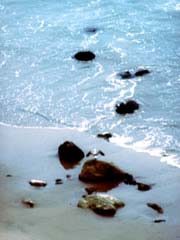Search Results for: ocean

Chameleons walk on water
Reptile history reveals daring escape from Madagascar
Land-lubber chameleons navigated the oceans to spread around the world. Stowed away on tree rafts, the animals were ferried to distant shores, new research suggests 1 .
Chameleons aren’t good swimmers: their mitten-like feet are made to grasp twigs and trees. Yet the intrepid animals charted the seas several times in the past 26 million years, say Chris Raxworthy of the American Museum of Natural History i

Exploding star strafed Earth
A supernova may have caused mass extinction two million years ago.
The explosion of a dying star could have ended much of marine life on Earth two million years ago. The supernova could have strafed the Earth’s atmosphere with cosmic rays, severely damaging the ozone layer and exposing living organisms to high levels of the Sun’s hazardous ultraviolet rays, US researchers propose 1 .
This idea dates back to the 1950s, but now Narciso Benítez of Johns Hopkins

A voyage from space to sea with Envisat
Envisat, whose launch is scheduled end of February 2002, will tirelessly sweep the Earth`s surface and atmosphere, using a suite of ten different scientific instruments.
Over a 35-day cycle, the satellite`s orbit will cover the entire planet, and then start all over again. Two thirds of the time it will be over water. Because of the sheer size of the oceanic currents, the complexity of thermal exchanges, and ocean-atmosphere coupling, the ocean is a crucial factor in explaining the w

Equatorial water belt slackens
30 years of slowing Pacific circulation may have changed climate
A recent slowing in the circulation of Pacific Ocean waters could have raised Pacific sea surface temperatures. It may even mean that less carbon has reached the atmosphere from the ocean surface over the past two decades.
Across the Pacific, water circulates in two giant loops in the Northern and Southern Hemispheres. It flows from the subtropics to the tropics about at a depth of 100-400 metres, rises to the
Floodplains expert to train African environment managers
The delicate balance of life and death in Africa is nowhere more evident than on the banks of the continent`s mighty rivers. Rural communities depend on the rich silt brought down by rivers for farming but they are also at risk of devastating floods, as are urban dwellers in informal settlements that are often built on floodplains.
Dr Sue Marriott, reader in earth sciences at UWE`s Faculty of the Built Environment, is setting off this month to help with training environmental managers in fl
Atmosphere and Oceans Finely Balanced
The atmosphere and oceans exist in a delicate state of balance according to research co-ordinated by the University of East Anglia (UEA) and published this month by the Natural Environment Research Council (NERC).
The recently completed five year research programme of Atmospheric Chemistry Studies in the Oceanic Environment (ACSOE) concludes that atmospheric pollution travels much further than previously thought and that this has important consequences for global chemistry and climate.